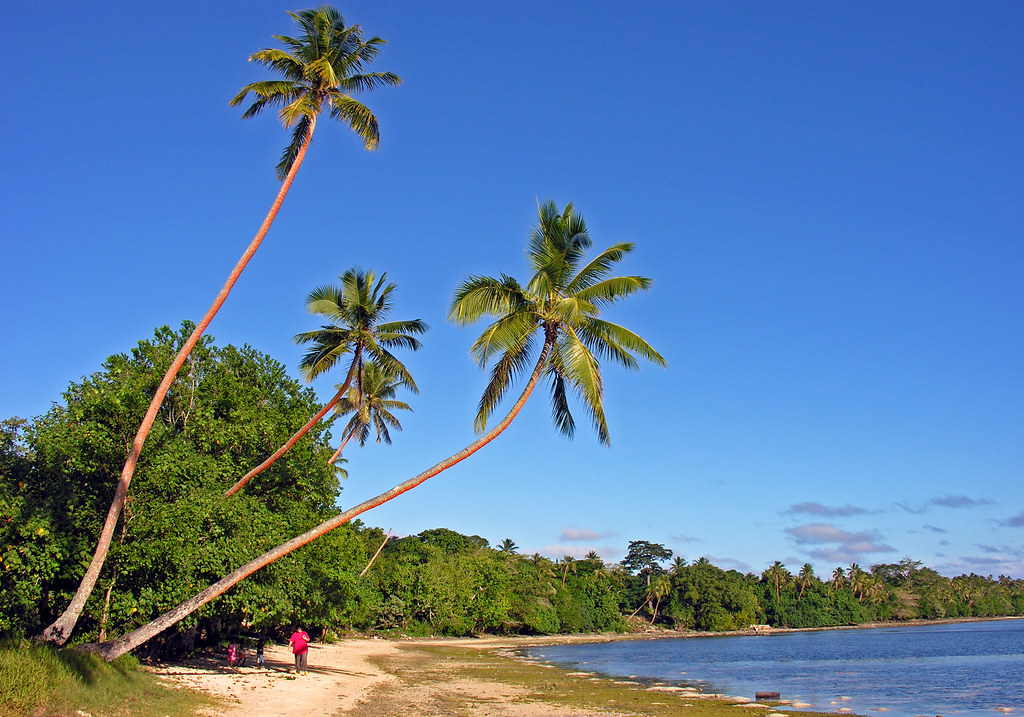Writing Vanuatu
Travel journalism is largely a matter of being there: seeing places through fresh eyes, recording what is, describing the world in new ways. But when we live in the world of The Web, is writing remotely a valid approach? I recently played with this idea and submitted a feature to VSAs annual journalism comp, aimed at raising awareness of issues in international development. I feel it would’ve been better with first-hand access to the country in question, but that wasn’t on the cards so I gave it my best shot from my long suffering armchair. Have a read and see what you think!

Beyond Survivor Island: Education from Within in Vanuatu
Take a trip to Vanuatu via Google search, and lurking amongst the lucrative holiday packages and cheap island flights, you will find a collection of Survivor: Vanuatu—Islands of Fire episodes. The 2004 American reality T.V. show showcases the white-sand beaches and palm-fronded foreshore, hysterical girls in bikinis, and a long-running tribal rivalry, yet we are left to wonder at the real Vanuatu—that day to day place where people work, eat, and—with a bit of luck—go to school. While the fictional stand-off between rival tribes Lopevi and Yasur was probably never meant to make thought provoking material about the real, and somewhat elusive, Vanuatu, there are some interesting parallels.
In the show, tribes are divided by gender, with Lopevi being a tribe of males and Yasur their female counterparts. There are issues of disability and sexual orientation, and, unsurprisingly perhaps, numerous challenges to be overcome and problems to solve along the way. In one such challenge contestants must race to obtain pigs in order to secure a reward for their tribe. Races and puzzling mazes are rife, it seems. But what does this bring to bear on the present day situation in Vanuatu? Fast forward to 2015, and a very real and stark situation of national ‘survivor’ is playing out in Vanuatu. The country is on the long and painful path to recovery following the destruction of Cyclone Pam in March 2015. Its citizens are the brave contestants; their challenges are the day to day struggles of living amongst broken infrastructure, broken homes, environmental change and the aftermath of natural disaster.
But if every coconut has its copra lining, so too does the broken heart of Vanuatu. From devastation new beginnings are born. Already work is underway, and while pigs run wild where fences have been destroyed, building materials have arrived and progress is taking shape. International aid will play a large part in remedying the immediate situation in Vanuatu, but in the long-term quality education is also important. In island nations such as Vanuatu, where the environment plays such an integral part in the success or failure of the community and its economy, education should be both for and about that environment: how to manage sustainable agri-business, promote the well being of natural resources and mitigate against future climatic and environmental changes.
However, education can be to international development, what mazes are to reality T.V. shows: a huge selection of possible choices, options, outlets and end points, some viable others less so, and all of them combining to create a potentially vast amount of confusion to anyone hoping to bring about change. While it might be easy to buy into quick-fixes, it’s clear that meaningful change will take more than that. There are questions around who should lead change: the developing country itself, or those assisting in the developments from outside? There are questions over the most useful approach, how to ensure change will outlast the next cohort of aid workers and volunteers; how best to facilitate skills exchange and long-term learning?
With Cyclone Pam just a mere six months past, education is perhaps now more important than ever before. Not only are the islanders facing the gargantuan task of rebuilding quickly with a minimum of materials and dwindling financial assistance packages, but long term resilience and a view to the future will need to come into its own—and quickly. In the season finale of Survivor: Vanuatu there is but one contestant left, a sole-survivor. In the recovery of Vanuatu, the country, there is hope for a more equitable outcome. An education for all—girls and boys, able and disabled, rich and poor, young and old.
Imagine, then, a country where people raise awareness from within: trained and talented professionals aware of projected sea level rise in the coming decades, able to accurately assess risk and hazard in coastal areas and communicate effectively with their communities as to the best steps to take. Then go one step further, to a country where development is completely self-directed, and the game-plan as firmly rooted in local soil as taro and yams. Naturally, that means that the agenda will be truly Ni-Vanuatu in its roots—a local take on what positive change actually means, how that change will be implemented, and by whom. This may mean that what is decided as the best strategy may seem completely at odds with Western ideas of progress. It may mean repeating mistakes that have been made elsewhere. It could be the best of both worlds.
© E. C. Richardson All images courtesy of Google Open Image